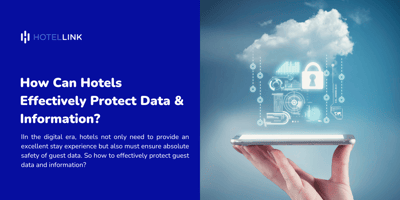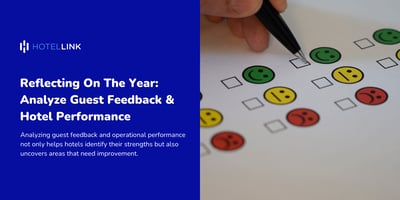Have you ever wondered what would happen if your guests’ booking data or credit card information...
The Importance of Data Security in Hospitality Industry
In an era where digital technology is continually advancing, data security has become a critical issue for every industry, especially the hotel industry. Neglecting data security can lead to severe consequences, not only harming guests but also severely damaging the reputation and survival of a hotel. So, what needs to be done to enhance data security in the hospitality industry?
Sensitive Customer Data and Security Risks
Hotels are repositories of sensitive and valuable information, making the protection of customer data not just a legal responsibility but a vital component in building trust and loyalty with guests. Personal information such as names, addresses, contact details, and payment information are incredibly sensitive and can be targeted by hackers if not properly secured. Therefore, implementing strict security measures is mandatory to ensure that this information is not leaked or misused.

Protecting Personal Information
One of the most effective ways to protect personal information is through data encryption. Encryption transforms information into complex strings of characters that can only be deciphered by authorized systems or users. This is especially important when data is transmitted over the internet, where the risk of interception and theft is high.
Additionally, establishing restricted access rights is a crucial measure. Only essential personnel should have access to sensitive information, and this must be closely monitored to prevent internal data leaks.
Threats from Cyber Attacks
Given the high-value data stored by hotels, they frequently become targets of cyberattacks. These attacks are not only complex but also sophisticated, requiring hotels to always be in a state of preparedness to prevent breaches.
Unique Challenges
The hotel industry faces several unique data security challenges, making information protection even more difficult:
-
Short-term Stays: Hotel guests often stay for a short period, making identity verification and data security more challenging. Ensuring that these customers' data is not leaked after they leave the hotel is a major challenge for the industry.
-
Multiple Data Access Points: Guest data is stored and accessed at various locations within the hotel, such as the front desk, restaurant, and hotel management system. This increases the risk of data leakage due to the many access points that hackers can exploit.
-
Use of Mobile Devices: Hotel staff frequently use mobile devices to access guest data, which can create risks if these devices are not properly secured. Employees using personal mobile devices to access hotel systems can pose high-security risks if these devices are not adequately protected.
Preventive Measures
One of the most fundamental measures to protect systems from security vulnerabilities is regular system software updates. Developers continually release patches to fix newly discovered vulnerabilities. Timely software updates help prevent hackers from exploiting these weaknesses to launch attacks. Additionally, implementing intrusion detection and prevention systems (IDS/IPS) is crucial in detecting and stopping unauthorized intrusions before they can cause harm.
Training staff in information security is also an essential part of a hotel’s security strategy. Staff need to be equipped with the knowledge to recognize signs of cyberattacks and how to respond promptly, thereby contributing to a strong security culture within the hotel.
Apart from these general security measures, hoteliers should also consider other solutions designed to meet the industry's specific needs.
Read more: Payments | PCI Compliance Requirements for Merchants
Benefits of Data Security
Data security not only helps protect guest information but also brings numerous other benefits to hotels. When guests feel their information is protected, they are more likely to trust and use the services, increasing the chances of repeat business and fostering long-term relationships with the hotel.
Enhancing Guest Trust and Satisfaction
Today’s guests are highly concerned about the protection of their personal information, and a hotel that can demonstrate secure data protection will gain trust and support from its guests. When guests feel secure, they are more likely to return and recommend the hotel to friends and family, effectively expanding the hotel’s market share.
Minimizing Risks and Losses

By implementing robust security measures, hotels can minimize the risk of cyberattacks and avoid the financial losses caused by such attacks. Furthermore, ensuring data safety helps hotels avoid the reputational damage that information leaks can cause.
-
Fraud Prevention: The hotel industry is a common target for fraudulent activities, such as credit card fraud and fake bookings. Implementing strong data security measures can help prevent these fraudulent activities and protect hotels from financial losses. For instance, hotels can set up payments like Hotel Link Pay equipped with card verification steps (3DS) to enhance security and combat fraud during transactions.
-
Compliance with Legal Requirements: There are many laws and regulations requiring hotels to protect guest data. Failure to comply with these regulations can result in fines and other legal consequences.
-
Reputation Protection: Data breaches can severely damage a hotel’s reputation. Guests may be reluctant to stay at a hotel that has experienced data leaks, leading to lost revenue and guests.
Read more: Understanding about Hotel Link Pay
Improving Operational Efficiency and Management
A solid security system not only protects data but also helps improve hotel operational efficiency. When management systems run smoothly without technical issues, hotels can focus on providing the best possible service to guests, thus enhancing guest experience and creating real value for the business.
Trends in Data Security in the Hotel Industry
Artificial Intelligence
In the future, data security will continue to be a key element in the business strategies of hotels. Some data security trends that hotels can adopt include applying artificial intelligence (AI) to quickly detect and respond to security threats. AI systems have the capability to analyze large data sets and recognize unusual patterns that human eyes might miss, effectively boosting security capabilities.

Biometric Authentication
Biometric authentication, such as fingerprinting, facial recognition, and iris scanning, is becoming more popular, offering an additional layer of security for system access. This technology not only improves safety but also enhances customer experience, allowing them to access services quickly and conveniently.
Conclusion
Investing in data security is a smart decision that helps hotels overcome the challenges of the digital age and build long-term trust with customers. Strengthening data security not only protects customers but also helps maintain the reputation and sustainable development of the business. Hoteliers can contact technology experts to ensure that the hotel is using the best security measures.
If you are interested in these data security and hotel management information, contact Hotel Link today!



